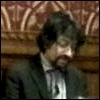The US government’s record in directly perpetrating or being complicit in the crime of genocide in many regions of the world – even at the present time, as much as in the recent past – was deeply unsettling, and needed to be recognised and confronted, argued Desmond Fernandes, a former senior lecturer in Human Geography and the Geography of Genocide at De Montfort University in the UK. Speaking at a conference held in a UK House of Commons room earlier this month, and discussing genocide cases past and present across the world, Fernandes drew attention to the on-going genocide of Eezham Tamils and the PPT judgement. Noting with concern that struggle against genocide itself is criminalised nowadays, he emphasized on the need of action in solidarity by targeted peoples.
 “Acknowledging genocide itself is a fundamental means of struggling against genocide,” Fernandes cited a PPT verdict of 1984, and added citing Gregory Stanton on Armenian genocide that “ Denial […] is actually a continuation of the genocide.”
“Acknowledging genocide itself is a fundamental means of struggling against genocide,” Fernandes cited a PPT verdict of 1984, and added citing Gregory Stanton on Armenian genocide that “ Denial […] is actually a continuation of the genocide.”
Fernandes noted on the huge, sophisticated, genocide-denialism industries and structures that are in operation today.
He cited Rick Rozoff in listing out the US involvement in genocides across the world, directly or in collusion with a client regime and on the government-media-obedient academia triad presenting it as legitimate actions in pursuit of praiseworthy policies.
Fernandes cited Abdullah Ocalan on the frustration of Kurds over the US geopolitics: “For 60 years the USA’s politics have been dependent on the cultural genocide policy against Kurds. To gain the support of Turkey and Israel in the region, the Middle East and Caucasus, the USA has supported the policy of cultural genocide that has been implemented against the Kurds.”
Talking on Turkey, he said, “the colonialist mind-set for cultural genocide still continues” in Turkey.
Bodies such as the United Nations and the European Union are also responsible for facilitating genocide. The United States and her ‘allies’ have made a mockery of the UN ‘Responsibility to Protect’ initiative, Fernandes observed.
On the International Criminal Court (ICC), he observed that genocide here is not only being halted by the US and its ‘allies’, but the ICC is also not acting as it should to hold those responsible to account. Asking why, he cited Edward Herman saying in 2013 that the ICC has a record as an annex of white imperial power.
Talking on ‘Developmental’ genocides taking place across the world, he cited India and Balochistan as examples.
The following was his citation on the PPT – Bremen verdict on Sri Lanka: “The Tribunal finds that genocide against the Eelam Tamil group is a continuing process … The Tribunal believes that the UK, the USA and India are guilty of complicity in genocide. Further, the Tribunal judges that the UK and the USA are clearly accomplices in the genocidal process … The United Nations … had a decisive role in the failure to prevent as well as in the enactment of the genocidal process against the Eelam Tamils … The European Union [also] … contributed to the implementation of the genocidal process”.
Fernandes noted that national and supra-national bodies have questionably drawn up ‘terrorism lists’ and proscription regimes.
Political movements, diasporic communities and individuals resisting repression and genocide have been criminalised through these ‘lists’ and regimes. In such criminalised contexts are many public struggles against genocide and oppression taking place, he further said, emphasising the need to reflect upon these matters and act upon these concerns and engage in solidarity with targeted ‘Others’, wherever they may be.
Desmond Fernandes is a member of the Peace in Kurdistan Campaign and a former Senior Lecturer in Human Geography and ‘The Geography of Genocide’ at De Montfort University, UK. He is the author of The Kurdish and Armenian Genocides: from Censorship and Denial to Recognition? (Apec, 2007; Peri, 2013), co-author of The Targeting of ‘Minority Others’ in Pakistan (BPCA, 2013) and has written numerous articles on genocide and the targeting of the ‘Other’. His works have been translated into a number of languages including English, French, German, Dutch, Greek, Turkish and Kurdish.
His paper was presented at the ‘Holocaust Commemoration and Genocide Awareness’ meeting, the House of Commons, Committee Room 16, Westminster, 4th February 2014. Organised by the Universal Peace Federation (UPF) and hosted by Mr Virendra Sharma, MP.
* * *
Commenting on his paper, Tamil activists for alternative politics in the island said that it should be an eye-opener to the installed Tamil politicians in the island and to the articulators in the diaspora, who continue with the decades-old historical blunder of Eezham Tamils in harping on the deceptions of the West and fail in placing the struggle of Eezham Tamils in its proper global perspective.
Citing ‘cultural pluralism’ and ‘reconciliation’ approach advocated by the US Asst Secretary of State, Nisha Desai Biswal, during her visit to Jaffna, and the following lamentation of NPC chief minister C. V. Wigneswaran over the ‘tragic abandoning’ of pluralism in the island, as well as his reference to Amartya Sen’s culture, freedom and development, the activists for alternative politics in the island said that there is no point in harping on them.
From the very outset of the ‘sounding nice and sane’ concepts that were hatched by the institutions in the West, the Establishments in the USA and the West were the ones that were primarily responsible for discrediting the concepts and deceiving humanity by deploying them to justify the paradigm of genocide and imperialism. We could practically see that from the talk and deeds of those who profess them in the island, the activists for alternative politics further commented.
External Links:
Balochwarna:
‘Some Perspectives on Genocide’ – By Desmond Fernandes
(For updates you can share with your friends, follow TNN on Facebook and Twitter )
